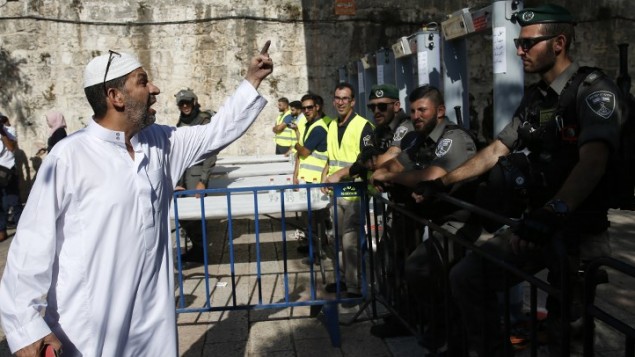Officials slam Israeli ‘terrorist procedures’ in Old City after metal detectors, cameras installed; at least 15 injured in East Jerusalem night of unrest

The Fatah movement, headed by Palestinian Authority President Mahmoud Abbas, called for a “Day of Rage” on Wednesday to protest new security measures installed by Israel at the Temple Mount in Jerusalem starting Sunday, two days after a terror attack by three Israeli-Arabs killed two Israeli police officers.
Following Friday’s terror attack, Israel closed the compound for the first time in decades, reopening it to Muslims on Sunday and to non-Muslims on Monday.
As part of the security measures taken in the wake of the shooting to prevent further such attacks, police installed metal detectors at the entrance to the site, which Jerusalem police commissioner Yoram Halevi said were necessary for it to reopen. Friday’s gunmen, residents of the northern Israeli city of Umm al-Fahm, emerged armed from the compound and opened fire on the police officers stationed outside.
Fatah on Monday called for marches in the West Bank toward Israeli checkpoints in protest of the new measures and announced that Friday prayers, when many worshipers go to the Temple Mount, would be conducted in public squares instead. The decision was made following a meeting between Fatah Revolutionary Council secretary Adnan Ghaith, Fatah central committee member Jamal Muheisin, and Fatah representatives from the northern West Bank.
The group said the measures were called in order to denounce Israeli “terrorist procedures” in the Old City, according to a report in Ma’an.
The officials called for maintaining the delicate status quo at the Temple Mount, denouncing a “fierce and organized attack” by Israel against East Jerusalemites.
Israeli border policemen install metal detectors outside the Lion’s Gate, a main entrance to the Temple Mount, in Jerusalem’s Old City, on July 16, 2017, after security forces reopened the ultra-sensitive site, whose closure after a deadly attack earlier in the week sparked anger. (AFP/ AHMAD GHARABLI)
The “Day of Rage” announcement came amid a night of unrest in East Jerusalem and the Old City as Palestinian rioters clashed with police, hurling stones and firebombs and blocking roads. At least 15 were injured, according to the Palestinian Red Crescent.
Police officers called to Lions Gate in the Old City to disperse protesters blocking a road were attacked with rocks and other objects
The Red Crescent told the Palestinian Wafa news agency that five protesters were injured during the confrontations, including the chairman of the Palestinian National Initiative party, Mustafa Barghouti. The Wafa report said that three people were injured after being beaten by police, one person was injured by a stun grenade and Barghouti was hit in the head with a rubber-coated bullet.
Clashes were also reported in the East Jerusalem neighborhoods of Silwan and Issawiya. Rioters hurled stones and Molotov cocktails at police officers who responded with riot-dispersal means.
The placement of the metal detectors at the Temple Mount has also been met with outrage by the Muslim religious authority charged with managing the Temple Mount. Muslims have held prayers outside the metal detectors to protest their placement at the gates.
Along with other Islamic groups, the Waqf trust, which administers the site, on Monday called on Muslims “to reject and boycott all the Israeli aggression measures, including changing the historical status quo including imposing the metal detectors.”
In its statement, the Waqf called on the faithful not to enter the mosque by passing through the metal detectors, adding, “If the metal detectors continue to be imposed, we call upon the people to pray in front of the gates of the mosque and in the streets of Jerusalem.”
Muslim worshipers pray outside the Old City of Jerusalem’s Lions Gate in protest of the placement of metal detectors at entrances to the Temple Mount on July 17, 2017. (AFP Photo/Ahmad Gharabli)
On Monday afternoon, light clashes broke out in the Old City, when police ordered a group of Muslim protesters off a road they were trying to block with a prayer session. Police said a Muslim teenager was arrested after throwing a bottle at police.
Scuffles also broke out on Sunday, but police said hundreds of Muslims visited the site nonetheless.
Jews revere the site, where the two Jewish temples stood in biblical times, as the Temple Mount. It is the holiest site in Judaism and the nearby Western Wall, a retaining wall of one of the temples, is the holiest place where Jews can pray.
Muslims regard the same hilltop compound as the Noble Sanctuary. Home to the Al-Aqsa Mosque and Dome of the Rock. It is Islam’s third-holiest site, after Mecca and Medina in Saudi Arabia.
The fate of the compound is an emotional issue and forms the centerpiece of rival Israeli and Palestinian national narratives. Any perceived changes to the delicate arrangements at the site can spark tensions. Its closure after Friday’s attack prompted condemnations from the Arab world, many of which made no reference to the terror attack that prompted the closure.
Dov Lieber and AP contributed to this report.






The presence of that mosque is just too politically inflammatory.
It needs to be sold off and moved to, I don’t care, Arabia.
The Arabs will hoot and howl, for the TV cameras, for three days and continue to whine (indefinitely) about the illegal Israeli occupation of Jerusalem, but that’s all.
No more of this relentless baloney about the site’s “sacredness” to Islam.
As if a movable structure (with a fairy tale better suited for Antiques Roadshow) is of inestimable value, but the cost of all the lives ruined in its “defense” and in pursuit of its “liberation” doesn’t add up to much.
You know, it wouldn’t be the first time that a government made some politicizable object disappear.